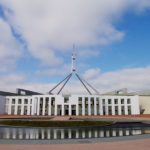Act of Recognition
As a new parliamentary year kicks off, ANTaR’s National Director, Jacqueline Phillips, hopes our political leaders can transcend party lines to ensure recognition of Aboriginal and Torres Strait Islander peoples is granted.
The Australian Parliament is, tomorrow (13 February 2013), expected to vote on a bill that could see Australia take another step towards due recognition of the First Peoples of this land.
Some of you will be aware of moves to change Australia’s Constitution to recognise Australia’s First Peoples. Some may even have heard about proposals to address racist aspects of our founding document and ensure that all Australians are protected from being discriminated against on the basis of their race, culture and ethnicity. These conversations have been happening for some time, initially led by a panel appointed by the Government in 2010 that found widespread community support for change.
Unfortunately, many Australians remain unaware of the racially discriminatory origins of our constitution and its silence with respect to the First Peoples. Indeed, we have a long way to go to build the level of community awareness needed to ensure a successful referendum, which requires a majority of voters and a majority of states to vote ‘yes’.
For this reason, the Australian Government announced late last year that it would not hold a referendum on Constitutional Recognition in this term, as previously planned. Instead, it announced that an Act of Recognition would be introduced to acknowledge the First Peoples – essentially, putting together a timetable for a future referendum to take place within the next Parliament.
The Act of Recognition is not, and must not be seen to be, a substitute for constitutional reform. However, it does have merit as a step along the road. Importantly, it offers a mechanism for all parties to affirm their ongoing commitment to constitutional change. It also outlines a broad (but not binding) timeframe for a referendum, through inclusion of a sunset and review clause.
Finally, it is an opportunity for our political leaders to unite to build community awareness of the important changes being considered to ensure our nation’s founding document reflects the principles of respect and racial equality.
As the founding document of our nation, the Constitution should reflect the unique status of our original inhabitants and the diversity and richness of modern Australia. Many Australians would be surprised to learn that our Constitution permits racial discrimination. As it stands today, the Constitution contemplates state governments lawfully excluding Aboriginal people from voting and empowers the Commonwealth Government to make laws that disadvantage Aboriginal people.
We now have an historic opportunity to address the hurtful omissions and discrimination within our highest law and create a new, respectful framework celebrating the richness of Aboriginal and Torres Strait Islander cultures and languages. This will take political leadership and must transcend party lines.
The Election will test the current cross-party consensus, but it is essential that it is maintained all the way to referendum day. A successful referendum will also need to be supported by a broad movement of Australians – Aboriginal and non-Indigenous people working together – to capture the hearts and minds of their fellow Australians. Success is possible, as the extraordinary result achieved in the 1967 referendum showed us, but it will need each and every one of us to play our part.
Jacqueline Phillips has been the National Director of ANTaR, a national Aboriginal and Torres Strait Islander people's rights and reconciliation advocacy organisation since April 2010. She has previously worked as a Policy Officer at the Australian Council of Social Service (ACOSS), on social security, housing and Indigenous policy issues. Jacqueline has a First Class Arts/Law degree from the University of Sydney and a Masters in Law from McGill University, Canada. Her Masters Thesis was on native title law.













